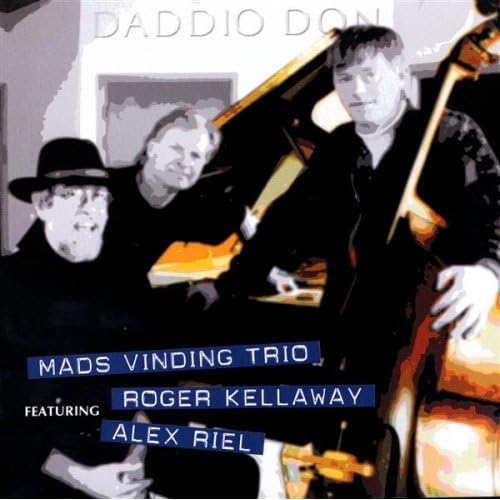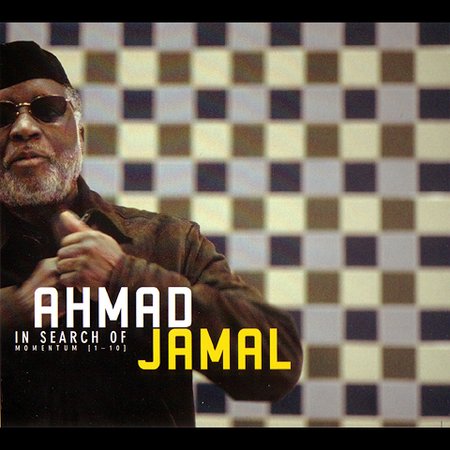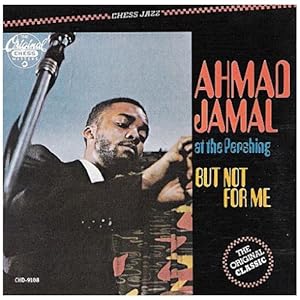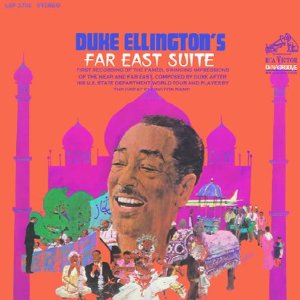| Image courtesy of soundcloud |
Recent listening, current
Archived listening, 2013-2016
Showing posts with label piano. Show all posts
Showing posts with label piano. Show all posts
Thursday, April 24, 2014
193. Mads Vinding Trio / Daddio Don (1998)
A while back, I recommended an album with Mads Vinding to a friend who loves the upright bass. It's his favorite instrument. We chatted about the Danish bassist and both agreed he's a hard one to not like. A few weeks later he gave me some CDs that, for whatever reason, didn't pan out for him the way he expected. It happens. But I was thrilled because among them was Daddio Don. I listened to it for the rest of the afternoon before promoting it to a coveted spot in the rotation of my daily commute. Vinding is impossible to keep up with, the tireless recording and performing artist for whom the word "prolific" seems inadequate. He's all over the map, discographically speaking, but always right where you need him with the soulful interplay, keen rhythmical knack, and melodic inventions that surpass keeping time for the time's sake. He has a sixth sense for interplay, or a humble ear for the group dynamic, always listening to what the other musicians are doing. I appreciate his earnest touch with the blues and immediate facility for navigating uptempo and bebop that remind me of Ray Brown (another favorite musician). His choruses are not boring, they're more like short songs. To paraphrase C. Michael Bailey's piece for AllAboutJazz.com, Vinding is like the Nordic George Mraz, expressing himself with a confident stride and robust tone that tricks the ear into hearing a full rhythm section where none is present. The trio is comprised of Vinding, drummer Alex Riel, and pianist Roger Kellaway. Kellaway has a sensitive understanding of the piano's dynamics, and moves with irresistible swing.
More importantly, Kellaway has a penchant for odd time signatures (the album is titled for Don Ellis), and all three musicians are comfortable breezing through meters like Kellaway's "Seven," or Thad Jones' "A Child is Born" in 11/8. Riel's timekeeping is sumptuously alert. His dreamy brush work is punctuated by pertinent, percussive accents and taut interjections on the snare that make the emotive and pensive, often introspective set as lush and flush as a well arranged quintet. "How Deep is the Ocean" is intriguing, demonstrating the shared chemistry of the trio. It's a touch faster than is typical, and the order of its open sections are negotiated as you hear them. It typifies the musical cooperation which is the album's hallmark. If you're the type of listener that enjoys quiet spaces with tricky corners, a shared creation of three musicians that reveals the sheer clumsiness of language when describing a mere "piano" trio, then Daddio Don needs to be on your list. And if you try it but you don't enjoy it, perhaps you can pass it on to a friend.
Friday, April 11, 2014
191. Fred Hersch - Alone at the Vanguard (2011)
Hersch plays in his characteristically slick and lyrical style in this collection of live, solo recordings. The gently meandering set is just over an hour long but
was culled from an entire week of performances at the Vanguard in 2010. Hersch's back catalog of superb trio records has given him all the leeway that could be expected from the trio format, but alone, he is free to wander a little farther from the yard, in both time and route, as with Sonny Rollins' "Doxy," or the elegant salute to Thelonious Monk's "Work." In the absence of the drums and bass, he develops sweeping melodic arcs in each piece, and displays refined senses of harmony and dynamics. With several numbers he tips his hat to inspiration from friends and figures like Robert Schumann, Bill Frisell, and Lee Konitz. My favorite piece is the disc's opener that I know as a favorite Frank Sinatra song (although it has been covered countless times since). "In the Wee Small Hours of the Morning" is rendered so poignantly as to touch the emotional depth achieved by Sinatra on the 1955 album.
Labels:
2010,
2011,
alone at the vanguard,
fred hersch,
jazz,
live,
palmetto,
piano,
review,
solo,
tribute
Saturday, March 15, 2014
190. Erroll Garner / Jazz 'Round Midnight (1991)
Compilations from Jazz 'Round Midnight are usually good, and while this one is no exception, it tends to be monopolized by downtempo ballads. Across 16 tracks, listeners hear Garner's solo and trio recordings from the mid '40s and '50s. You get the basic idea -- contrasts of soft with loud, twinkling arpeggios from the right hand, chord tracing from the left. But the towering crescendos and dizzying excitement that so frequently come up when people talk about Garner seem missing. Things heat up a little in "I've Got The World On A String" and especially "Part Time Blues". Garner's punchy rhythmic accents and huge, bluesy blocks remind me of why I love the piano of Duke Ellington and Oscar Peterson. While I appreciate them for the variety, I want more. None of this, however, should detract from the stately beauty of "I Can't Get Started" or "Misty." As Garner is one of those pianists who has been anthologized and repackaged a thousand times, this installment could be worth passing over. But in a lot of other ways it's a good one for the car, for after a hard day, or for audiences that are unlikely to gripe about the track sequence as I have. I almost forgot to mention the last track, a 10:42 solo take of "Over the Rainbow." It leaves me spellbound and feeling guilty for taking issue with any of the above.
Labels:
1945,
1946,
1949,
1954,
1955,
1957,
1991,
compilation,
erroll garner,
gitanes,
jazz round midnight,
piano,
piano trio,
polygram,
trio,
verve
Monday, March 3, 2014
189. Donald Fagen / Morph the Cat (2006)
Morph the Cat is a good representative of the Donald Fagen solo catalog. It is every yard a Fagen product whose pristine sonics and glossy group choruses recall the perfectionist grandeur of Aja and underplayed soul vamps of Gaucho or Nightfly. I prefer the guitar on Morph by Wayne Krantz, his variety of techniques and effects, to the guitars heard on Sunken Condos. Fagen also rocks the Fender Rhodes, ringing in that classic Steely Dan sound. Some lyrical themes nod in the direction of the aged, slyly morose matters explored further on Condos. But at this stage, our heroes, perhaps, aren't as willingly resigned to their fates as they will be in 2012. Some of these characters make the best of the New World Order, however, swaggering into the 21st century as if it were still 1975. Like the guy who picks up the TSA girl in "Security Joan." Fagen is the only living writer other than Murakami who can write a guy into a one night stand at the airport. But they're not all success stories. Former showbiz kids make jaundiced appearances in songs like "The Night Belongs to Mona," or the the unwitting pokes whose night vices all lead them to meet the man in the "Brite Nightgown." You'll be in familiar company with the motley assortment, and all nine tracks are rendered in sparkling audio.
Tuesday, February 25, 2014
188. John Lewis / Evolution II (2000)
When he recorded Evolution II, Lewis had long since achieved the accomplishments that would define his impact on jazz. But saying as much is unfair for this man. I scratch my head and marvel, open my ears and let the piano fill them with knowledge. His technique is still surprising, oscillating from arranged structures to improvised heavy swing. Here he reinterprets his own pieces in three separate continua: a gleaning from the past, the import of the present, and the dictates of his present moment. It shrugs at commercial boxes like "pop," "classical," or "jazz" by exposing commonalities in the ineffable and truly nameless thing that we call "music." As always, it points in a new direction. Maybe a little like Paul Desmond, his understated touch can miss you the first time, then devastate the second. Like Ahmad Jamal, he understands the penetrating effects of silence and balance. Or like Mingus, depth allows for endless reimagining. The meandering stroll down memory lane seeks unexplored areas of familiar paths. Whether the march from "Trieste," for instance, "Winter Tale" or the unmistakable strains of "Django," this effort proves that without Milt, another MJQ was impossible, but Lewis' mission would continue. Kudos to Lewis Nash, whose complex, articulate and just brilliant drumming puts all the pieces in place.
Tuesday, December 10, 2013
158. Dick Hyman & Ralph Sutton (1993)
This magical live set was recorded at Berkeley's Maybeck Recital Hall in 1993. Both players have a grand command of the keyboard, and a little bit like the piano recordings of Duke Ellington, they render the music with the arranger's ear for an orchestra. Hyman is off to the left, Sutton on the right. Hearing the two styles in opposition is a marvelous thing. Tumbling down the stairs in effervescent flurries from the high end is Hyman, while Sutton provides a canvas of chording and big rhythmic anchor. Sutton's choruses in tunes like "I'm Gonna Sit Right Down and Write Myself a Letter" are comparatively rowdy, bordering on barrel house, filled with booming chords and a topsy-turvy swing. Clocking in just shy of five minutes, I think the tune could easily have gone another round, but what we get is such a skyrocket that it's impossible to complain. "Everything Happens to Me" is a solo feature for Sutton, while Hyman gets "Ol' Man River" all to himself. In the latter, Hyman's lines demonstrate a dazzling fluency in blues, bop, and balladry. A shimmering collection of piano jazz by two undisputed masters of the instrument, I highly recommend this collection.
Labels:
1993,
1994,
concord,
dick hyman,
duo,
jazz,
live,
piano,
ralph sutton,
review
Monday, December 9, 2013
157. Gene Harris Quartet with Frank Wess / It's the Real Soul (1995)
Recorded live across two nights in March of 1995, these eight tracks feature the Gene Harris Quartet (Ron Eschete, g; Luther Hughes, b; Paul Humphrey, d) in the company of Frank Wess. Wess divides his time between four tracks, playing tenor on "Menage a Bleu" and "Estoril Soul," then flute on "Straight No Chaser" and "My Funny Valentine." He is as expressive on the flute as Harris is on the piano, unleashing a diverse assortment of perky phrases and exciting techniques that frame the Monk tune in a perfectly jaunty way, and adding lots of personality to "My Funny Valentine." Nice as it is to have him around for the proceedings, the core band plays with such a big sound and heavy swing that I don't miss him on the other half of the record. Harris works well with guitarist Eschete. Their cooperation in splitting the breaks of "Lady Be Good" turns the old tune into a memorable affair, their choruses developing patiently until the mood reaches a fever pitch. "That's All," which is the last tune on the album, is a fitting closer. Harris teases "Rhapsody in Blue" before really pounding into fully chorded statements, with the crowd loving it. His style on the keyboard is often described as being rooted in a gospel tradition and tracks like "You Don't Know Me" clearly substantiate those descriptions.
Labels:
1995,
1996,
concord,
flute,
frank wess,
gjavascript:void(0);ene harris,
gospel,
guitar,
jazz,
live,
luther hughes,
paul humphrey,
piano,
quartet,
quintet,
review,
ron eschete,
tenor sax,
tenor saxophone
Saturday, September 21, 2013
141. Monty Alexander, Ray Brown, Herb Ellis / Triple Treat (1982)
For various reasons, the cover of this recording seems oddly appropriate. A photograph of a three-scoop ice cream sundae makes a cheeky pun for the piano trio's sweet and sometimes quirky set of tunes like Blue Mitchell's "Fungi Mama" (with fun quotes by Ellis, and some jangly syncopation by Alexander) or the hot side-opening "(Meet The) Flintstones." Monty Alexander fills the piano chair and I don't think he sounds one bit like Oscar Peterson, in spite of Brown and Ellis being longtime members of that musician's group. The other music on the album is equally sweet and creamy, as with the sumptuous "Body and Soul" and "Sweet Lady," or swinging "When Lights are Low." Also notable is the title track, the "Triple Treat Blues." Chemistry, relaxed atmosphere and slick, baton passing choruses of these three musicians make a buoyant and memorable session that is out of print but worth seeking out. If you enjoy this lineup, be sure to check out their other albums, as well.
Labels:
1982,
bass,
concord,
guitar,
herb ellis,
jazz,
monty alexander,
piano,
piano trio,
ray brown,
review,
trio,
triple treat
Thursday, September 5, 2013
131. Ahmad Jamal / In Search of Momentum (2003)
Jamal is an excellent player, strong as ever and still developing past age 70. In Search of Momentum is a prime example, the kind of record that makes other new things feel stale (here "new" is 2003). His enthusiasm for contrasting percussive block chords with what I like to call 'negative space' on the piano is matchless. His style is ever more rhythm driven, and it's full of energy for standards like "Where Are You." In the opening "In Search Of" he plays with some sly quotes that bring a grin. In "Should I?" he characteristically mixes a heavy left hand with intermittent flourishes of the right, building to thundering crescendos a la Erroll Garner, then reclining in moments of delicate quietude. He works closely with his excellent trio, who are James Cammack on bass and Idris Muhammad (a personal favorite, nice to see him here, too) on drums. Jamal is aggressive and often angular, and his style shouldn't be a stretch for fans of more overtly experimental pianists like Cecil Taylor. O.C. Williams joins Jamal for the beautiful "Whisperings," the album's sole vocal spot and another opportunity for Jamal to stretch out his dynamic approach to the keyboard. And by the way, the liner says that Jamal's hat was designed by Ishmullah's Famous Hats of Oakland, California. Too bad Monk wasn't around long enough to endorse men's haberdashery.
Saturday, August 31, 2013
129. Hank Jones and Frank Wess / Hank and Frank (2006)
Requiring no introduction, Hank Jones and Frank Wess have one of the best jazz albums of the past 20 years. Aside from Jones and Wess, bassist John Webber (try "You Made a Good Move") guitarist Ilya Lushtak, and drummer Mickey Roker make an appreciable impact, too. This is uber classic jazz with universal appeal. The joy in listening, for me, comes from how together the group is. Playing this music is beyond natural to the co-leaders and on the record, the product of their skills sounds as easy as breathing. Wess doubles on tenor and flute. To make a play on that line about "breathing," try listening to his beautiful lines on ""The Very Thought of You." There is a wide variety of material from blues to bossa nova, and don't miss the four originals by Wess or the tune by Mr. Parker like "Barbados." Best of all, if you can't get enough of Hank and Frank then you can always buy the second volume. Yes, there is a second volume.
Labels:
2006,
blues,
bossa nova,
flute,
frank wess,
hank and frank,
hank jones,
hard bop,
ilya lushtak,
john webber,
lineage,
mickey roker,
piano,
quintet,
review,
tenor sax,
tenor saxophone
Tuesday, August 27, 2013
127. The Dave Brubeck Octet (1950)
I find this, the Octet's only studio album, a roaring good listen. I enjoy it alongside the Birth of the Cool by the Miles Davis Nonet. Both are similar in size and in their means of repurposing, so to speak, some of our more venerable standards like "What is this Thing Called Love" or "September in the Rain." The group's personnel is notable too, considering their different trajectories after the Octet: Tjader became known for the vibes, Van Kriedt for education, and Collins for Woody Herman. The pieces have tight arrangements that sound cool and loose, reeling with the energy and excitement of dixieland. But there's an ever present discipline behind them, too, and the innovation of infusing jazz with classical forms of writing and arranging. The soloists are concise, wrapping their choruses in 8 or 12 bars, staying close to the melody with strong voice leading. Many stayed in the repertoire of the Dave Brubeck Quartet so it's fun to compare the bobbing and weaving counterpoint with later performances of the same tunes, like our opener "The Way You Look Tonight," which I associate with Desmond's snarky quotes from Stravinsky and that nasty blues lick from Jazz at Oberlin. In fact, come to think of it, it's been a while since giving that one a spin....
Labels:
1950,
bob collins,
cal tjader,
classical,
cool,
dave brubeck,
dave brubeck octet,
dave van kriedt,
dick collins,
fantasy,
jack weeks,
octet,
paul desmond,
piano,
standards,
west coast,
william smith
Monday, August 19, 2013
125. Dave Brubeck Quartet / Dave Digs Disney (1957)
For all its thunder and snark, the Brubeck quartet improvised with a childlike curiosity, and Brubeck and Desmond both employed a genuinely sentimental touch with ballads. Maybe it's the music's built-in humor and romance, but I sense something very natural about this group covering Disney songs. Of course, the band was no stranger to the material, so there's the easy explanation, but they're clearly enjoying it. "Alice in Wonderland" is a breezy treat, with Desmond blowing blues into his explorations of the theme before trading jabs with Brubeck. "Heigh-Ho" is rendered at an uptempo clip and with a tough tone by Desmond before a romp by Morello. But it's shortest piece on the album and for all its perkiness, it's almost a footnote. A few pieces retrospectively transcend the Disney brand such as "When You Wish Upon a Star," or "Some Day My Prince will Come." The latter would eventually be made famous by Miles Davis, and is a further example of Brubeck's prescience. I overlooked this set for a long time because I thought it was a novelty act, but I was dead wrong. For further examples of Disney jazz, try Disney Songs the Satchmo Way, Everybody Wants to be a Cat, or Sun Ra's reverently maniacal settings of "Heigh Ho" and "Zip-A-Dee-Doo-Dah," among others.
Saturday, August 10, 2013
122. Charlie Haden / Night and the City (1996)
Night and the City has an extra attraction for me, because I love the film by Jules Dassin. Anyway, they're not related, but it's a great record. It was recorded for Verve at the Iridium in NYC, home to many a great night of live music (see HughGotIt's excellent uploads of the Ed Palermo Big Band for a glimpse of when the tiny room really gets rocking, and also some of Hugh's other great live video work). This time Haden teams up with Kenny Barron on the keys. Their music is elegant and sparse, but not at all vacant. It's reverent of jazz from an earlier era, and even its title recalls a romantic notion of the city as theater of life. Barron's opening "Twilight Song" sets the pace. The tunes are mostly standards, with one original by Haden ("Waltz for Ruth") and Barron's aforementioned "Twilight" being exceptions. "Body and Soul," as if anyone can get away from it, is thoughtful and majestic and makes a perfectly timed appearance midway through the disc. I think the collection is a treat, and each player exercises a remarkable restraint to let the other sing and breathe as needed. It's thick on mood, but not overly heavy, and I highly recommend it.
Labels:
1996,
bass,
charlie haden,
duo,
iridium,
jazz,
kenny barron,
live,
night and the city,
piano,
review,
standards,
verve
Sunday, August 4, 2013
120. Ahmad Jamal / At the Pershing, But Not For Me (1958)
Out of Jamal's handful of live albums, each one a gem, At the Pershing stands out to me as essential listening. It was originally released on Chess Records' Argo label and became a smash hit, a coup for the label that had recorded a goodly variety of music but not broken into the jazz markets held by Blue Note, Verve, Columbia, or smaller labels like Prestige. Widely influential, it's become a classic. Jamal's emergent style is the principal attraction but the trio consisting Israel Crosby and Vernell Fournier isn't to be fooled with. Their brand of jazz is superbly crafted and seamlessly executed. Cooperation and interplay between bass, drums and piano is supernatural. Listen to the sparse but beautiful "Poinciana," demonstrating Jamal's wise but playful use of space and silence while the rhythm section carries a percussive groove. Some of the selections clearly presage the work of Miles Davis' first great quintet. My only complaint? On the original liner, Jamal writes that he himself selected eight tracks of the 43 they recorded 16 January 1958. Gambit's Complete Live at the Pershing Lounge 1958 offers only 20 tracks. I did the math, and while Jamal is still playing dates, it'd be darned nice to have those missing tapes....
Tuesday, July 9, 2013
113. Duke Ellington / Far East Suite (1967)
Last month, I rolled down the windows of my car after working a 12-hour day, twisted the cap off an ice cold Virgil's Orange Cream soda, and enjoyed the drive
home while listening to this record. The Far East Suite is one of Duke's last recorded works, and one whose material might sport the familiar names and faces of orchestras past but its compositions have a unique flavor among others in the Duke canon. It's been on regular rotation at my house since that evening with the soda pop. Between the grooves are yards of punchy counterpoint between reeds and brass, and some of Johnny Hodges' sweetest work on wax ("Isfahan"). And of course we are treated to equally fine work by the likes of Cootie Williams, Cat Anderson, Russell Procope, Harry Carney, et al. The recording is memorable throughout thanks to Duke's direction of the sublimely cohesive band. It is nice to hear Duke melding his percussive piano blues with sophisticated orchestral textures and touches of middle eastern music or orientalism in tracks like "Mount Harissa," "Ad Lib on Nippon" or the opening "Tourist Point of View." I was swept up by the tidal wave of sound, which is what usually happens when I listen to Mr. Ellington.
Labels:
1967,
big band,
bluebird,
cootie williams,
duke ellington,
far east suite,
harry carney,
isfahan,
jazz,
johnny hodges,
orientalism,
paul gonsalves,
piano,
rca,
review,
russell procope
Saturday, April 27, 2013
94. Thelonious Monk Quartet with John Coltrane at Carnegie Hall (2005)
Considering the complexity of Monk's style and the assertive individuality of Coltrane's style on the tenor, this music isn't just blazingly good, it's also surprisingly cohesive, at least to me. Rediscovered 2005 at the Library of Congress, it sheds invaluable light on the fabled partnership between Monk and Coltrane. Monk is so energetic, he's jumping all over the keyboard like popcorn, supported by a really intuitive drummer in Shadow Wilson. Sometimes Coltrane lays out for long section while Monk sketches the melody or takes a chorus. But when Coltrane steps back in, Monk comes alive in give-and-take interplay that surges the whole group ahead. Coltrane isn't giving us a smattering of scalar flights of fancy. He's carefully picking and choosing his spots as an ensemble player and featured soloist. It' so much more mature than the music previously available from this union, and kudos to all involved for bringing it out in the open. It makes me wonder what else is hidden in the Library of Congress?
Tuesday, April 23, 2013
90. Frank Morgan and George Cables / Double image (1986)
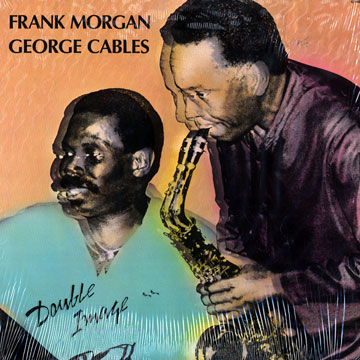 Another nice disc in Frank Morgan's comeback, and definitely something for the shelf. These two musicians are quite a pair. If a trio is less complicated and gives the leader greater clarity and flexibility than a quartet, then a duo takes that rationale to the next level. This album is aptly titled and features Morgan and Cables almost as sympathetic col-leaders. I'd love to hear Morgan's memories of the session. His alto is characteristically expressive. Together with Cables at the piano, they work through an interesting set list. I say it's interesting because there's only two chestnuts: "All the Things You Are" and "After You've Gone," which are quite good. The rest of the record is mixed of more recent stuff and a few originals. On the first side they do a really nice interpretation of Wayne Shorter's "Virgo" (sound the bias alarm, that's one of my favorite tunes) and "Blues for Rosalinda," which is a blues written by Morgan. Bop-inflected blues are his forte, complete with lightning-fast flurries of Birdlike chromaticity. In this regard, I am struck by how similar Morgan and Cables can be. Their choruses are saturated with the mood and use dynamics wisely, before flying up the registers in deftly fingered runs of dazzling acuity. The record closes with a meditative version of Miles' "Blue in Green," but not before Cables has a serious workout in his tune, "I Told You So," which you have to hear to appreciate. Seriously! It might be out of print, but if you can find a copy, buy it now.
Another nice disc in Frank Morgan's comeback, and definitely something for the shelf. These two musicians are quite a pair. If a trio is less complicated and gives the leader greater clarity and flexibility than a quartet, then a duo takes that rationale to the next level. This album is aptly titled and features Morgan and Cables almost as sympathetic col-leaders. I'd love to hear Morgan's memories of the session. His alto is characteristically expressive. Together with Cables at the piano, they work through an interesting set list. I say it's interesting because there's only two chestnuts: "All the Things You Are" and "After You've Gone," which are quite good. The rest of the record is mixed of more recent stuff and a few originals. On the first side they do a really nice interpretation of Wayne Shorter's "Virgo" (sound the bias alarm, that's one of my favorite tunes) and "Blues for Rosalinda," which is a blues written by Morgan. Bop-inflected blues are his forte, complete with lightning-fast flurries of Birdlike chromaticity. In this regard, I am struck by how similar Morgan and Cables can be. Their choruses are saturated with the mood and use dynamics wisely, before flying up the registers in deftly fingered runs of dazzling acuity. The record closes with a meditative version of Miles' "Blue in Green," but not before Cables has a serious workout in his tune, "I Told You So," which you have to hear to appreciate. Seriously! It might be out of print, but if you can find a copy, buy it now.
Friday, April 19, 2013
86. The Oscar Peterson Trio / Night Train (1962)
Probably the most well known of all Oscar Peterson dates, thanks to the archetypal deep swing of the title track. I read that Peterson's father was a railroad porter, and the composition and album are a tribute to him. The leader invests a lot of emotion in these quiet but swinging selections. There's a lot of good material on this record -- "C-Jam Blues," "Georgia on my Mind," "Moten Swing," "Honey Dripper," and "Night Train" are all bona fide classics. Peterson is comparatively quiet behind the keys, humming less and seemingly content while employing bouts of delicious slides and twinkling arpeggios to get his point across. He uses the dynamics of the keyboard very effectively to underscore the emotional impact of each piece. And remember those other two -- Ray Brown and Ed Thigpen -- ain't no slouches, either. I think Ray's about as bluesy as Oscar. Four stars, and a good album for a date.
Wednesday, April 17, 2013
84. Modern Jazz Quartet / Concorde (1955)
I vividly remember the day I bought this LP. It was among the first jazz records I ever purchased, and I found it sitting at a yard sale in the next neighborhood. I must have been about 15 years old. In a box filled mostly with movie soundtracks, I found Concorde along with MJQ's Fontessa and Black Sabbath's Live at Last. I bought all three for fifty cents apiece, and went home happy. I didn't know much about jazz back then, but after studying the back cover intently, I made the right choice. This album is classic MJQ and also features the debut of Connie Kay. The Gershwin medley is the centerpiece, paired with an innovative take of "Softly as in a Morning Sunrise" on the second side. But there are surprises everywhere, as with the quiet beauty of "All of You" or lively conversation between Jackson and Lewis on "I'll Remember April." Milt Jackson is a hero pretty much everywhere (can you tell I like him?), at once bluesy and virtuosic. There's strong musicality in each of the tracks blowing sections, and it's hard to tell that Kay hasn't been playing with the other three members all along.
Labels:
1955,
bass,
concorde,
connie kay,
drums,
jazz,
john lewis,
milt jackson,
mjq,
modern jazz quartet,
percy heath,
piano,
prestige,
quartet,
review,
vibes,
vibraphone
Thursday, April 11, 2013
78. Count Basie / Straight Ahead (1968)
Subscribe to:
Posts (Atom)
